英语:Unit3《Understanding each other》课件(译林牛津版选修6)
文档属性
| 名称 | 英语:Unit3《Understanding each other》课件(译林牛津版选修6) |
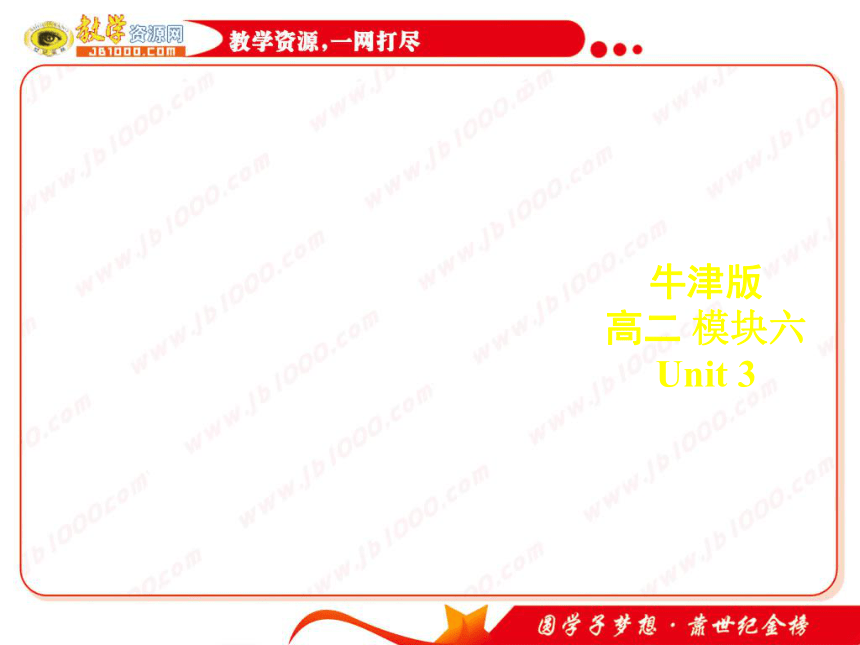
|
|
| 格式 | zip | ||
| 文件大小 | 1.3MB | ||
| 资源类型 | 教案 | ||
| 版本资源 | 牛津译林版 | ||
| 科目 | 英语 | ||
| 更新时间 | 2012-04-10 00:00:00 | ||
图片预览

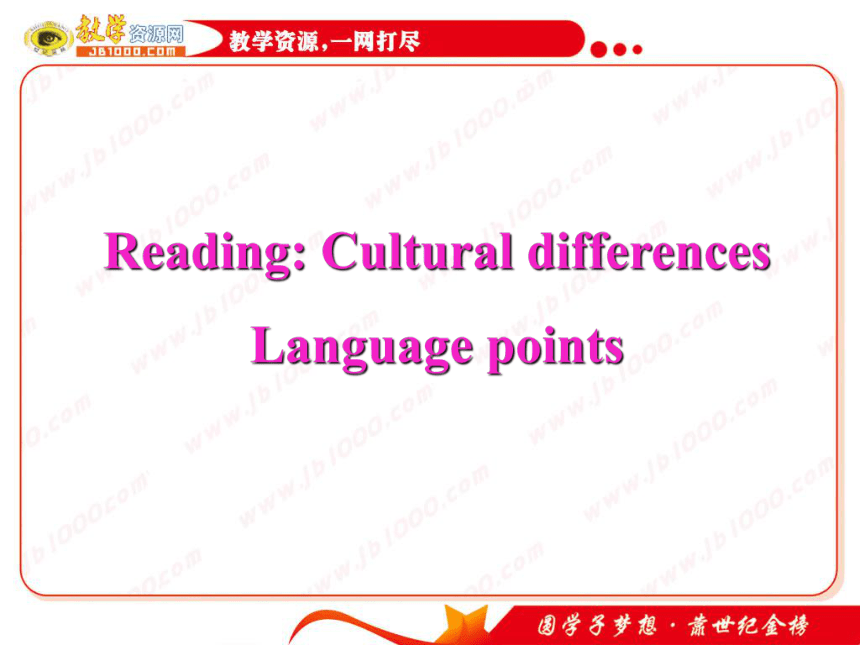
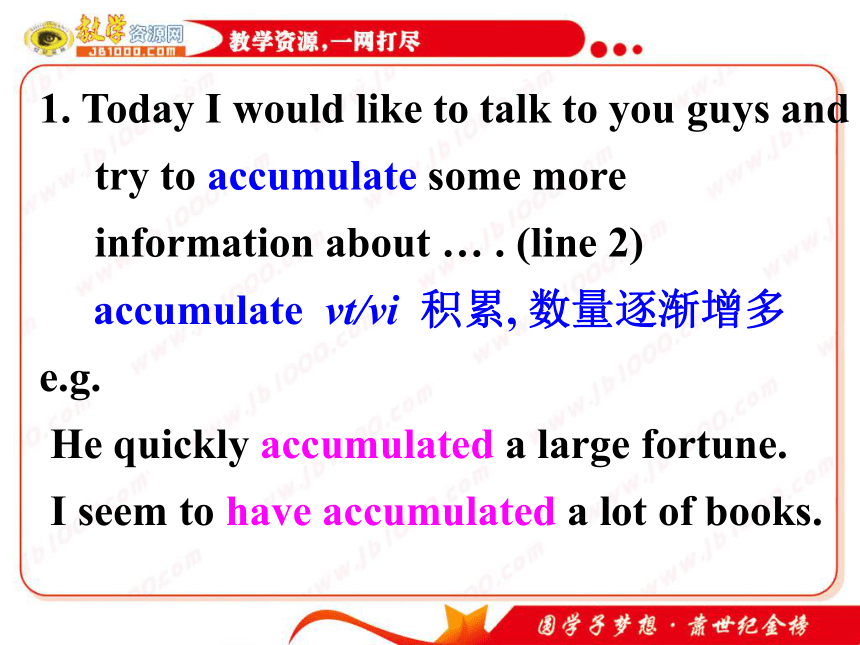
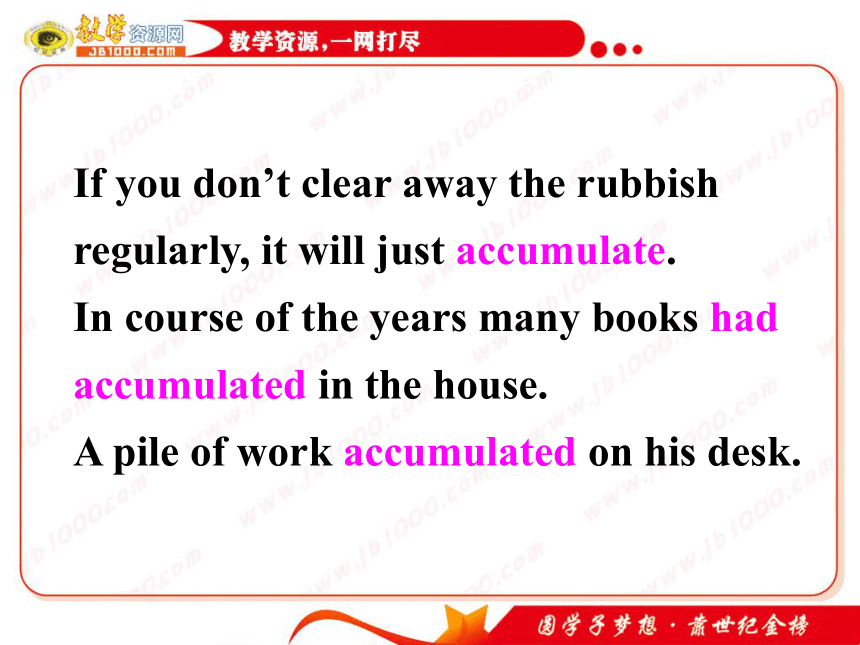
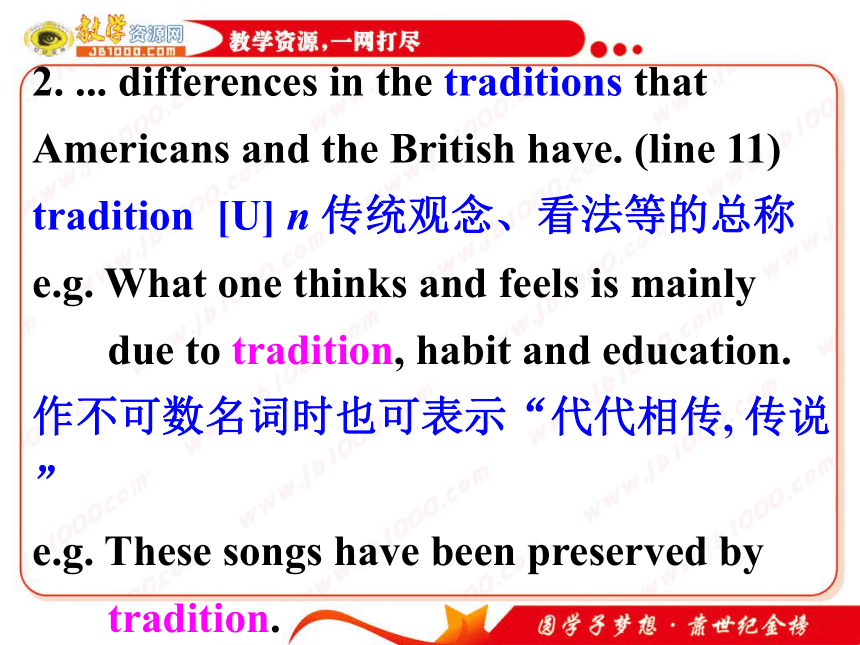
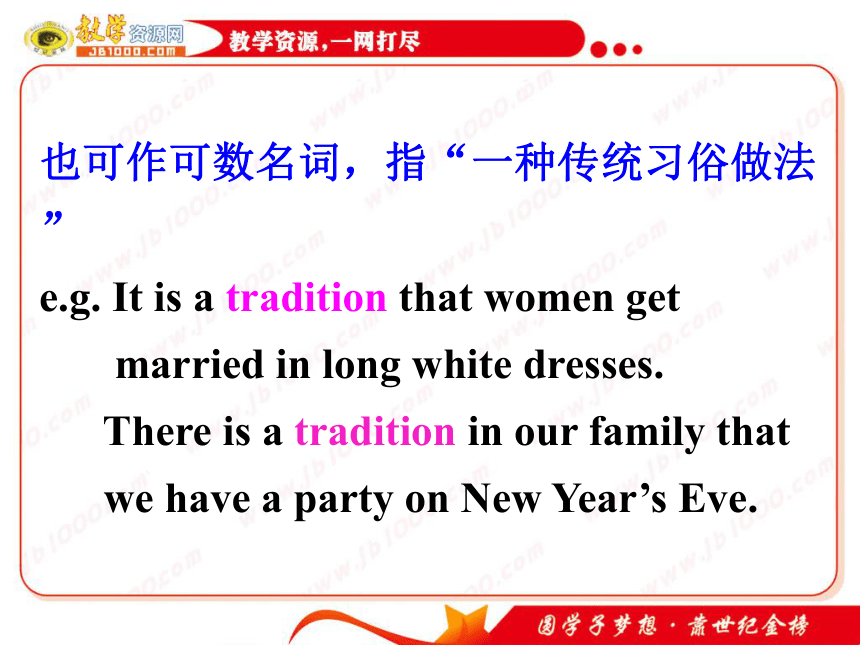
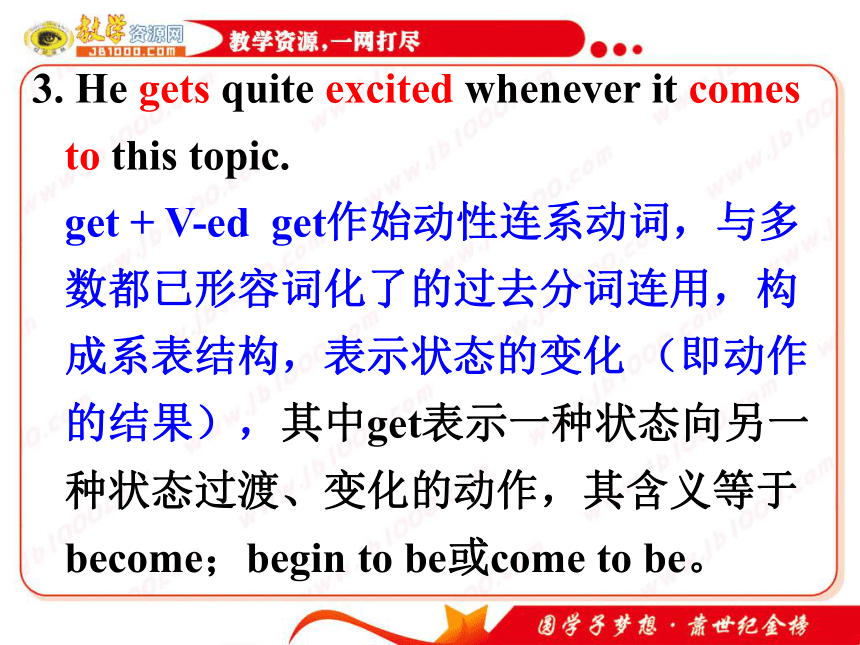
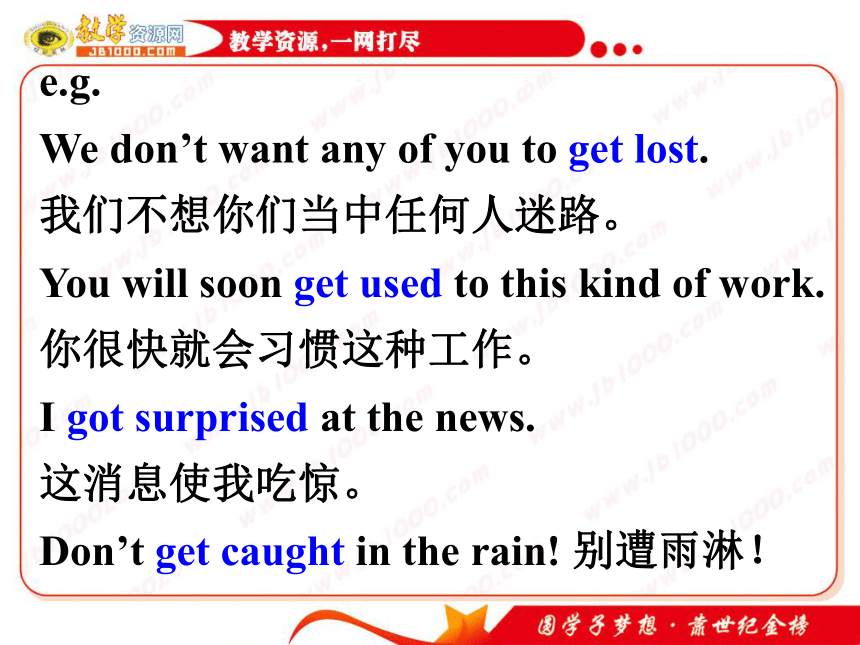

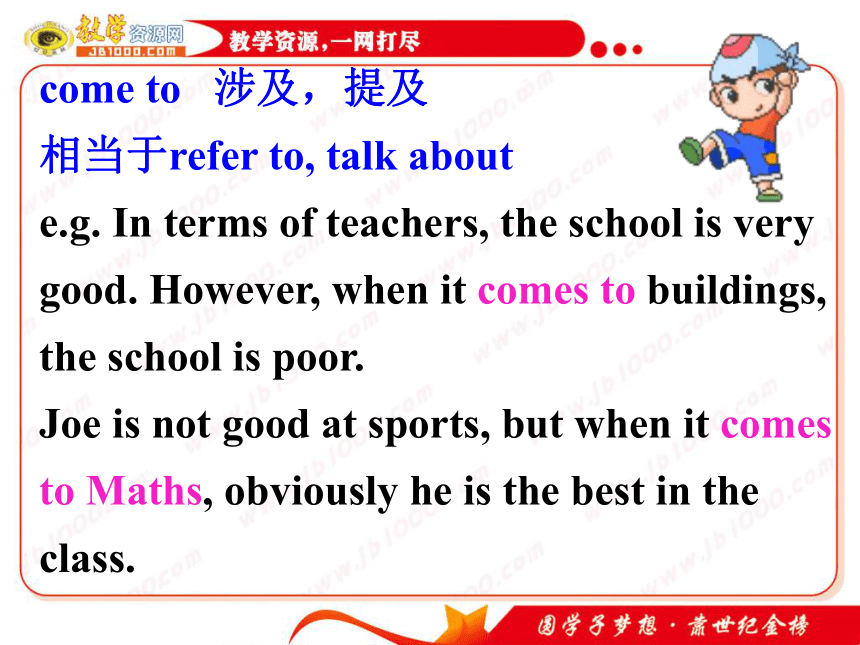
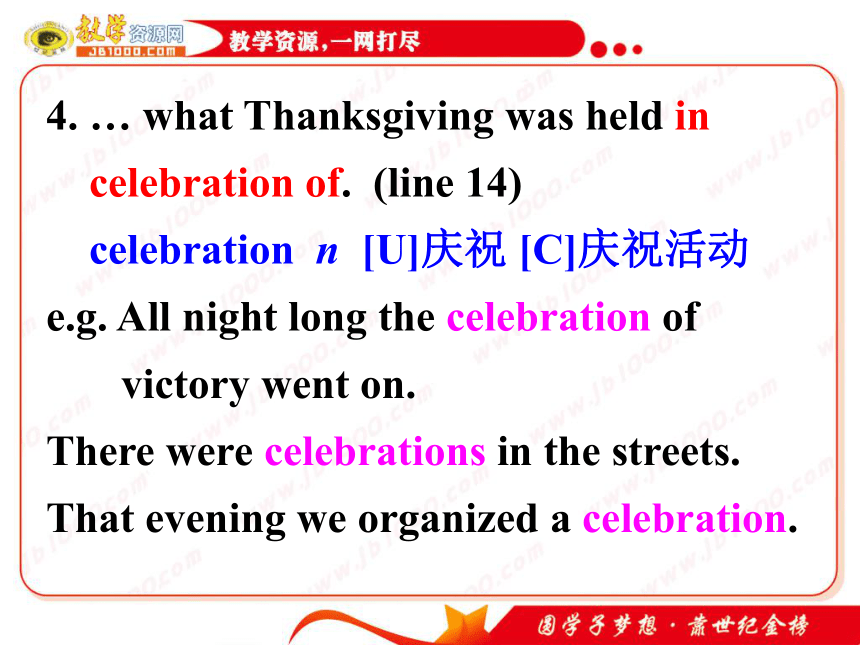
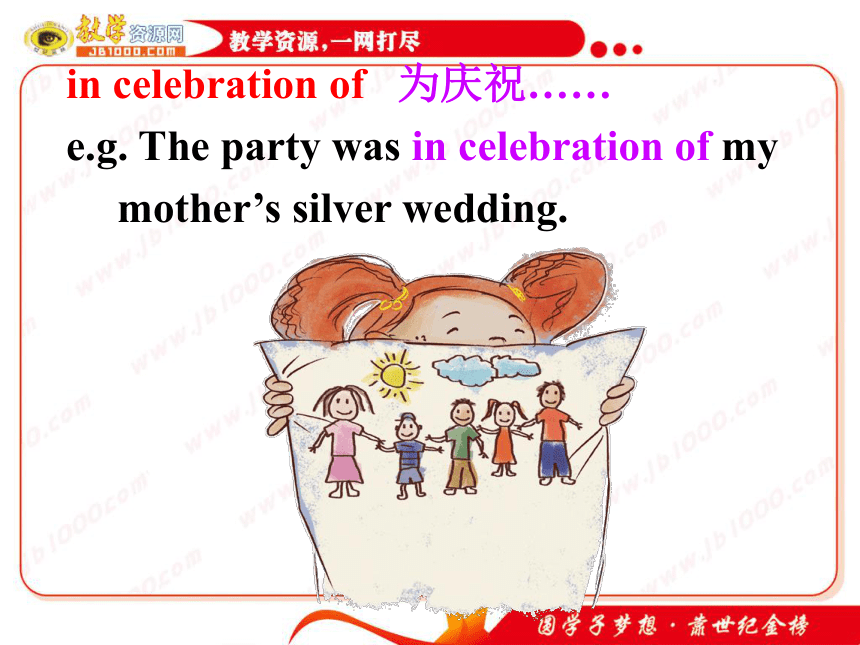
文档简介
(共46张PPT)
牛津版
高二 模块六Unit 3
Reading: Cultural differences
Language points
1. Today I would like to talk to you guys and try to accumulate some more information about … . (line 2)
accumulate vt/vi 积累, 数量逐渐增多
e.g.
He quickly accumulated a large fortune.
I seem to have accumulated a lot of books.
If you don’t clear away the rubbish
regularly, it will just accumulate.
In course of the years many books had
accumulated in the house.
A pile of work accumulated on his desk.
2. ... differences in the traditions that
Americans and the British have. (line 11)
tradition [U] n 传统观念、看法等的总称
e.g. What one thinks and feels is mainly
due to tradition, habit and education.
作不可数名词时也可表示“代代相传, 传说”
e.g. These songs have been preserved by
tradition.
也可作可数名词,指“一种传统习俗做法 ”
e.g. It is a tradition that women get
married in long white dresses.
There is a tradition in our family that
we have a party on New Year’s Eve.
3. He gets quite excited whenever it comes to this topic.
get + V-ed get作始动性连系动词,与多数都已形容词化了的过去分词连用,构成系表结构,表示状态的变化 (即动作的结果),其中get表示一种状态向另一种状态过渡、变化的动作,其含义等于become;begin to be或come to be。
e.g.
We don’t want any of you to get lost.
我们不想你们当中任何人迷路。
You will soon get used to this kind of work.
你很快就会习惯这种工作。
I got surprised at the news.
这消息使我吃惊。
Don’t get caught in the rain! 别遭雨淋!
get+ V-ed 还可表示被动,表示某一事件
或事故的发生,着重强调动作。 e.g.
Some glasses got broken when we were
moving.
我们搬家的时候有些玻璃杯被打碎了。
In the end his novel got translated into
French. 最后他的小说被译成法语了。
come to 涉及,提及
相当于refer to, talk about
e.g. In terms of teachers, the school is very
good. However, when it comes to buildings,
the school is poor.
Joe is not good at sports, but when it comes
to Maths, obviously he is the best in the
class.
4. … what Thanksgiving was held in
celebration of. (line 14)
celebration n [U]庆祝 [C]庆祝活动
e.g. All night long the celebration of
victory went on.
There were celebrations in the streets.
That evening we organized a celebration.
in celebration of 为庆祝……
e.g. The party was in celebration of my mother’s silver wedding.
5. So, to clarify, if I got married… .(line 36)
clarify vt 阐明, 澄清
e.g. His explanation clarified the mystery.
An example will help to clarify what I mean.
6. If a man participates in a wedding reception in Brunei… . (line 39)
participate vi 参加, 参与(常和in连用)
e.g. Harris participated in the protests.
Did you participate in the discussion
拓展:participation n 参加, 参与, 分享
e.g. Some of the magic tricks called for
audience participation.
7. It’s quite funny watching the new foreign teachers trying to adjust to doing that. (lines 50-51)
adjust v 调整, 调节
e.g. I must adjust my watch, it is slow.
Adjust your language to the age of
your audience.
常用结构:adjust to sth/doing sth
adjust yourself to sth
e.g. My eyes haven’t adjusted to the dark.
It took her a while to adjust to living alone
after the divorce.
You’ll quickly adjust yourself to student life.
拓展:adjustable adj. 可调动的, 可调节的
adjustment n. 调整, 调节, 适应
8. Well, guys, it’s time for me to log off.
It’s time for sb to do sth. (line 59)
e.g. It’s time for me to do homework.
拓展:time 相关短语
all the time 一直地
e.g. It rained all the time.
I kept it all the time to remind me of you.
at a time 依次;每次; 每一次 e.g.
You can borrow only one book at a time.
Take the pills two at a time.
at one time 一度, 过去曾经, 同时(做某事)
e.g. They all tried to talk at one time.
At one time I used to play a lot of sport, but I seem to have lost interest now.
At one time the majority of teachers are men, but now there are more women teachers.
at the time 那时候
I told you at the time that I thought you were stupid.
You pay for it at the time you order it.
at all times 随时;永远
e.g. We should at all times be aware of
our own shortcomings.
We must at all times keep up with
changing conditions.
难句解析
1. Today, I would like to talk to you guys and try to accumulate some more information about cultural differences because I have to do a piece of homework on cultural differences. (P34)
[分析] 1) 句子结构分析:在此句中,I would like to talk to you ... about cultural differences 是主句。在主句中,would like与try是由and 连接起来的并列谓语;to talk to you guys是不定式短语作would like的宾语;在不定式短语中,guys是you的同位语,它们都作介词to的宾语;后面的because I have to ... 是原因状语从句。
2) 语言知识分析:句子中,about cultural differences与on cultural differences都是介词短语作定语,意为“关于文化差异的”,但是about与on所表示的内容略有不同,前者指“对差异的描述性介绍”,而后者指“对差异的探讨性的研究”。
2. Well, if you had joined the chat room ten minutes ago, you would have known what we were talking about! (P34)
[分析] 1) 句子结构分析:在本句中,if you had ... 为条件状语从句,you would have known ...为主句;在主句中,what we were talking about为宾语从句,作know的宾语。
2) 语言知识分析:if ... had joined ... , ... would have known ... 为虚拟条件句,表示与过去事实不相符的一种情况。此时, 条件句中谓语动词一般用had done结构, 而主句中谓语动用would/ could/should/ might have done 结构。 e.g.
If you had prepared your lessons carefully,
you could have passed the exam.
3. I suppose Waled has already told you about the British teacher who opened the present as soon as he was given it at the end-of-term ceremony (P34)
[分析] 1) 句子结构分析:在本句中,I suppose是主句,整个后面的部分为宾语从句;在宾语从句中,Waled has already told you about the British teacher是主句,
后面who opened the present是定语从句,
修饰teacher;在定语从句中,as soon as...
引导一个时间状语从句。
2) 语言知识分析:as soon as意为“一……
就……”,引导时间状语从句。suppose意
为“认为,料想,假定”,常用句型:
suppose + that-clause ;
suppose sb. (to be) + adj. / n.
4. So, to clarify, if I got married in the UK, I would expect a present, but if I got married in Italy, I would have to give a present. (P35)
[分析] 1) 句子结构分析:在此句中,but连接两个并列的句子。if I got married in the UK是第一个分句的条件从句,I would expect a present是第一个
分句的主句;if I got married in Italy是第二个分句的条件状语从句,I would have to give a present是第二个分句的主句。
2) 语言知识分析:If ... did ..., ... would do ... 为虚拟条件句,表示与现在或将来事实不相符的假设。
5. If a man participates in a wedding reception in Brunei, he has to sit with the bridegroom and the other men. (P35)
[分析] 1) 句子结构分析:在此句中,If a man participates in a wedding reception in Brunei是条件状语从句,he has to sit down with ... 是主句;在主句中,
with the bridegroom and the other men是介宾短语作状语,修饰sit。
2) 语言知识分析:participate in相当于take part in,后面常接名词或V-ing形式作宾语,意为“参加(某种活动)”。
6. Another thing is, should you come to Brunei, you would have to take off your shoes before going into someone’s house! (P35)
[分析] 1) 句子结构分析:在此句中,Another thing is是主句,should ... 是表语。should you come to Brunei是表语从句中的条件状语从句,you would have to take off …是表语从句中的主句。
2) 语言知识分析:should you come to Brunei相当于if you should come to Brunei,意为“你如果来Brunei的话”,表示与将来事实不相符的假设。
[拓展] 在虚拟语气条件状语从句中,当从句的谓语含有were / had / should时,可以将连接词if省略,并将were / had / should提前到句首。
高考链接
1. He gets quite excited whenever it comes to this topic. (P34)
[考点] come to的用法
[考例] Most of us know we should cut down on fat, but knowing such things isn’t much help when it _____ shopping and eating.(天津 2006)
A. refers to B. speaks of
C. focuses on D. comes to
[点拨] 选D。when it comes to (doing) sth.“当涉及(做)某事的情况、事情或问题时”;refer to 参考,提及;speak of说起;focus on注意,聚焦于。
2. I suppose Waled has already told you
about the British teacher who opened
the present as soon as he was given it at
the end-of-term ceremony (P34)
[考点] suppose
[考例]
— You should apologize to her, Barry.
— ______, but it’s not going to be easy.
(浙江2007)
I suppose so B. I feel so
C. I prefer to D. I like to
[点拨] 选A。I suppose so表示同意对方观点。句意为:是这样的(我认为如
此),但这不是一件容易的事。I feel so我感觉如此;I prefer to我宁愿如此;I like to我喜欢。
3. It’s rude not to open a present when someone gives you one. (P34)
[考点] 代词one
[考例1] (陕西2007)
—There is still a copy of the book in the
library. Will you go and borrow _____
—No, I’d rather buy ___ in the bookstore.
A. it; one B. one; one C. one; it D. it; it
[点拨] 选A。第一空指代前面的a copy of the book,为同一物,用it;第二空指到书店去买一本书,泛指某一本,用one。
[考例2] I prefer a flat in Inverness to _____ in Perth, because I want to live near my Mom’s. (天津2005)
A. one B. that C. it D. this
[点拨] 选A。one为泛指,符合题意。其他为特指。
4. Well, it’s what we do in the west. (P34)
[考点]what 引导的名词性从句, 在句中作表语。 e.g.
This book is just what I am looking for.
All these are what you want in your life.
[考例]See the flags on the top of the building That was ____ we did this morning. (2006全国卷)
A. when B. which
C. where D. what
[点拨] 选D。后面的did是及物动词,因此此处所填表语从句的引导词要作其宾语,表示“……事情”。而when和where只能在表语从句中作状语,因此可以排除B, D;which意为“哪一个”,不符合题意。
牛津版
高二 模块六Unit 3
Reading: Cultural differences
Language points
1. Today I would like to talk to you guys and try to accumulate some more information about … . (line 2)
accumulate vt/vi 积累, 数量逐渐增多
e.g.
He quickly accumulated a large fortune.
I seem to have accumulated a lot of books.
If you don’t clear away the rubbish
regularly, it will just accumulate.
In course of the years many books had
accumulated in the house.
A pile of work accumulated on his desk.
2. ... differences in the traditions that
Americans and the British have. (line 11)
tradition [U] n 传统观念、看法等的总称
e.g. What one thinks and feels is mainly
due to tradition, habit and education.
作不可数名词时也可表示“代代相传, 传说”
e.g. These songs have been preserved by
tradition.
也可作可数名词,指“一种传统习俗做法 ”
e.g. It is a tradition that women get
married in long white dresses.
There is a tradition in our family that
we have a party on New Year’s Eve.
3. He gets quite excited whenever it comes to this topic.
get + V-ed get作始动性连系动词,与多数都已形容词化了的过去分词连用,构成系表结构,表示状态的变化 (即动作的结果),其中get表示一种状态向另一种状态过渡、变化的动作,其含义等于become;begin to be或come to be。
e.g.
We don’t want any of you to get lost.
我们不想你们当中任何人迷路。
You will soon get used to this kind of work.
你很快就会习惯这种工作。
I got surprised at the news.
这消息使我吃惊。
Don’t get caught in the rain! 别遭雨淋!
get+ V-ed 还可表示被动,表示某一事件
或事故的发生,着重强调动作。 e.g.
Some glasses got broken when we were
moving.
我们搬家的时候有些玻璃杯被打碎了。
In the end his novel got translated into
French. 最后他的小说被译成法语了。
come to 涉及,提及
相当于refer to, talk about
e.g. In terms of teachers, the school is very
good. However, when it comes to buildings,
the school is poor.
Joe is not good at sports, but when it comes
to Maths, obviously he is the best in the
class.
4. … what Thanksgiving was held in
celebration of. (line 14)
celebration n [U]庆祝 [C]庆祝活动
e.g. All night long the celebration of
victory went on.
There were celebrations in the streets.
That evening we organized a celebration.
in celebration of 为庆祝……
e.g. The party was in celebration of my mother’s silver wedding.
5. So, to clarify, if I got married… .(line 36)
clarify vt 阐明, 澄清
e.g. His explanation clarified the mystery.
An example will help to clarify what I mean.
6. If a man participates in a wedding reception in Brunei… . (line 39)
participate vi 参加, 参与(常和in连用)
e.g. Harris participated in the protests.
Did you participate in the discussion
拓展:participation n 参加, 参与, 分享
e.g. Some of the magic tricks called for
audience participation.
7. It’s quite funny watching the new foreign teachers trying to adjust to doing that. (lines 50-51)
adjust v 调整, 调节
e.g. I must adjust my watch, it is slow.
Adjust your language to the age of
your audience.
常用结构:adjust to sth/doing sth
adjust yourself to sth
e.g. My eyes haven’t adjusted to the dark.
It took her a while to adjust to living alone
after the divorce.
You’ll quickly adjust yourself to student life.
拓展:adjustable adj. 可调动的, 可调节的
adjustment n. 调整, 调节, 适应
8. Well, guys, it’s time for me to log off.
It’s time for sb to do sth. (line 59)
e.g. It’s time for me to do homework.
拓展:time 相关短语
all the time 一直地
e.g. It rained all the time.
I kept it all the time to remind me of you.
at a time 依次;每次; 每一次 e.g.
You can borrow only one book at a time.
Take the pills two at a time.
at one time 一度, 过去曾经, 同时(做某事)
e.g. They all tried to talk at one time.
At one time I used to play a lot of sport, but I seem to have lost interest now.
At one time the majority of teachers are men, but now there are more women teachers.
at the time 那时候
I told you at the time that I thought you were stupid.
You pay for it at the time you order it.
at all times 随时;永远
e.g. We should at all times be aware of
our own shortcomings.
We must at all times keep up with
changing conditions.
难句解析
1. Today, I would like to talk to you guys and try to accumulate some more information about cultural differences because I have to do a piece of homework on cultural differences. (P34)
[分析] 1) 句子结构分析:在此句中,I would like to talk to you ... about cultural differences 是主句。在主句中,would like与try是由and 连接起来的并列谓语;to talk to you guys是不定式短语作would like的宾语;在不定式短语中,guys是you的同位语,它们都作介词to的宾语;后面的because I have to ... 是原因状语从句。
2) 语言知识分析:句子中,about cultural differences与on cultural differences都是介词短语作定语,意为“关于文化差异的”,但是about与on所表示的内容略有不同,前者指“对差异的描述性介绍”,而后者指“对差异的探讨性的研究”。
2. Well, if you had joined the chat room ten minutes ago, you would have known what we were talking about! (P34)
[分析] 1) 句子结构分析:在本句中,if you had ... 为条件状语从句,you would have known ...为主句;在主句中,what we were talking about为宾语从句,作know的宾语。
2) 语言知识分析:if ... had joined ... , ... would have known ... 为虚拟条件句,表示与过去事实不相符的一种情况。此时, 条件句中谓语动词一般用had done结构, 而主句中谓语动用would/ could/should/ might have done 结构。 e.g.
If you had prepared your lessons carefully,
you could have passed the exam.
3. I suppose Waled has already told you about the British teacher who opened the present as soon as he was given it at the end-of-term ceremony (P34)
[分析] 1) 句子结构分析:在本句中,I suppose是主句,整个后面的部分为宾语从句;在宾语从句中,Waled has already told you about the British teacher是主句,
后面who opened the present是定语从句,
修饰teacher;在定语从句中,as soon as...
引导一个时间状语从句。
2) 语言知识分析:as soon as意为“一……
就……”,引导时间状语从句。suppose意
为“认为,料想,假定”,常用句型:
suppose + that-clause ;
suppose sb. (to be) + adj. / n.
4. So, to clarify, if I got married in the UK, I would expect a present, but if I got married in Italy, I would have to give a present. (P35)
[分析] 1) 句子结构分析:在此句中,but连接两个并列的句子。if I got married in the UK是第一个分句的条件从句,I would expect a present是第一个
分句的主句;if I got married in Italy是第二个分句的条件状语从句,I would have to give a present是第二个分句的主句。
2) 语言知识分析:If ... did ..., ... would do ... 为虚拟条件句,表示与现在或将来事实不相符的假设。
5. If a man participates in a wedding reception in Brunei, he has to sit with the bridegroom and the other men. (P35)
[分析] 1) 句子结构分析:在此句中,If a man participates in a wedding reception in Brunei是条件状语从句,he has to sit down with ... 是主句;在主句中,
with the bridegroom and the other men是介宾短语作状语,修饰sit。
2) 语言知识分析:participate in相当于take part in,后面常接名词或V-ing形式作宾语,意为“参加(某种活动)”。
6. Another thing is, should you come to Brunei, you would have to take off your shoes before going into someone’s house! (P35)
[分析] 1) 句子结构分析:在此句中,Another thing is是主句,should ... 是表语。should you come to Brunei是表语从句中的条件状语从句,you would have to take off …是表语从句中的主句。
2) 语言知识分析:should you come to Brunei相当于if you should come to Brunei,意为“你如果来Brunei的话”,表示与将来事实不相符的假设。
[拓展] 在虚拟语气条件状语从句中,当从句的谓语含有were / had / should时,可以将连接词if省略,并将were / had / should提前到句首。
高考链接
1. He gets quite excited whenever it comes to this topic. (P34)
[考点] come to的用法
[考例] Most of us know we should cut down on fat, but knowing such things isn’t much help when it _____ shopping and eating.(天津 2006)
A. refers to B. speaks of
C. focuses on D. comes to
[点拨] 选D。when it comes to (doing) sth.“当涉及(做)某事的情况、事情或问题时”;refer to 参考,提及;speak of说起;focus on注意,聚焦于。
2. I suppose Waled has already told you
about the British teacher who opened
the present as soon as he was given it at
the end-of-term ceremony (P34)
[考点] suppose
[考例]
— You should apologize to her, Barry.
— ______, but it’s not going to be easy.
(浙江2007)
I suppose so B. I feel so
C. I prefer to D. I like to
[点拨] 选A。I suppose so表示同意对方观点。句意为:是这样的(我认为如
此),但这不是一件容易的事。I feel so我感觉如此;I prefer to我宁愿如此;I like to我喜欢。
3. It’s rude not to open a present when someone gives you one. (P34)
[考点] 代词one
[考例1] (陕西2007)
—There is still a copy of the book in the
library. Will you go and borrow _____
—No, I’d rather buy ___ in the bookstore.
A. it; one B. one; one C. one; it D. it; it
[点拨] 选A。第一空指代前面的a copy of the book,为同一物,用it;第二空指到书店去买一本书,泛指某一本,用one。
[考例2] I prefer a flat in Inverness to _____ in Perth, because I want to live near my Mom’s. (天津2005)
A. one B. that C. it D. this
[点拨] 选A。one为泛指,符合题意。其他为特指。
4. Well, it’s what we do in the west. (P34)
[考点]what 引导的名词性从句, 在句中作表语。 e.g.
This book is just what I am looking for.
All these are what you want in your life.
[考例]See the flags on the top of the building That was ____ we did this morning. (2006全国卷)
A. when B. which
C. where D. what
[点拨] 选D。后面的did是及物动词,因此此处所填表语从句的引导词要作其宾语,表示“……事情”。而when和where只能在表语从句中作状语,因此可以排除B, D;which意为“哪一个”,不符合题意。
